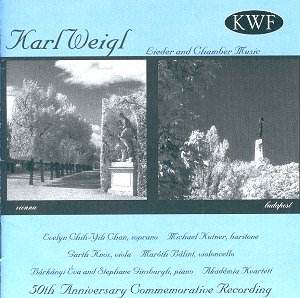Karl WEIGL (1881-1949)
Lieder and Chamber Music
CD1
Seven Songs Op. 1 (1903-4)
Selected Songs (1900-1936)
Five Duets for soprano and baritone (1909)
Five Songs for soprano and string quartet (1934)
CD2
Viola Sonata (1940)
Two Pieces for cello and piano (1940)
String Quartet No. 4 (1924)
 Evelyn Chih-Yih Chan (sop)
Evelyn Chih-Yih Chan (sop)
Michael Kutner (par)
Garth Knox (viola)
Maróth Bálint (cello)
Bárkányi Éva (piano)
Stephane Ginsburg (piano)
Akadémia Kvartett
rec Budapest, 4-7 Oct 1999
Special Limited Private Edition of 1000 2CD box-sets
50th Anniversary Commemorative Recording
 THE KARL WEIGL FOUNDATION KWF991001-2 [56.25+58.42]
THE KARL WEIGL FOUNDATION KWF991001-2 [56.25+58.42]

I was delighted recently when, having read my review of the
Nimbus recording of Karl Weigl's
string quartets 1 and 5, the composer's grandson (another Karl Weigl) contacted
me by e-mail. From this I discovered that there is a Karl Weigl Foundation
dedicated to the publication and recording of Weigl's music.
Biographical information can be found in my Nimbus review but here is another
composer banished from a Vienna intolerant of Jews and Socialists (Weigl
was both). He, in fact, left his departure rather late in the day. In any
event he was not alone. Indeed a number of his Vienna University students
also departed for the States during the 1930s. These included Frederic Waldman,
who later recorded the Weigl violin concerto with Sidney Harth and the Musica
Aeterna orchestra, and Peter Paul Fuchs who recorded the Comedy Overture
with the Baton Rouge Symphony.
The 2 discs in this set (trimly packaged in a single width case) divide neatly
into songs and chamber music.
The first disc contains the lieder. The Seven Songs Op. 1 are grave
echoes of Brahms' Vier Ernste Gesange. Written six years before Weigl
left the Vienna Opera to become a freelance composer they are student works.
Moments of hope and humour do intrude despite the words. This can be heard
in Der tag klingt ab and the stoic anvil-ringing heroism of Schmied
schmerz. The words are from Goethe, the Bible, Heine, Nietzsche and Bierbaum.
Many of the eight 'selected songs' are also earnest in tone though a lighter
note is sounded in Es Goss mein volles leben and Lied der
Schiffersmadels. There is a protesting prayer to Jesus [10] which
is more a strident poster than an intimate address. Der Toten Mutter and
Beatrix are grave while Das Rosenband, with its vagabond tonality
provides welcome relief as does the goblet clinking Liebesreime II.
Liebeslied (1936) depicts tranced lovers in expressionist style with
the piano part completely detached from the vocal line. The Five Duets
take us to Brahms again with echoes of the German Folk Song settings.
The highlights are the lovely Hymne and the Warlockian dance of
Ehestand der Freude. Finally, from 1934, five songs for soprano and
string quartet. These were premiered by Elisabeth Schumann with the Rosé
Quartet. With their many poignant touches this set is to be cherished. The
range is wide: from the liquid web of Trost to the icy Holstian fire
of Sommernachmittag (with its dreamy ppp fanfares for the first
violin); from the rainy nightmare of Regenlied to the stilly grace
of a child's vision of heaven in Ave Maria and concluding with the
Mahlerian fable of Einladung zur Martinsgans.
Neither sad nor utterly carefree the adagio and the allegro of
the 1940 Viola Sonata enclose a Mozartian ländler. The adagio's
tenebrous mood and harmonic complexity are perhaps informed by events on
a mainland Europe which, as a socialist and a Jew, he had had to leave in
1938 becoming a US citizen in 1943. An anxious cloud hangs over this work
even in the rustic dance of the allegretto commodo.
From the same year as the Viola Sonata come the Two Pieces for cello. These
represent the more accessible Weigl. Indeed the Love Song based on
the song Liebeslied (1936, on CD1) has the glowing sunset tones of
the Delius cello sonata. Wild Dance is also easy to appreciate, coloured
by Weigl's Rumanian heritage (though Viennese-born his parents were from
Transylvania) with a Beethovenian sense of conflict and a central passage
lovingly shaped by cellist Maróth Bálint.
Eight string quartets span Weigl's life. No. 4 shows the questing spirit
active in the 1920s. It was premiered in Berlin alongside works by Gál,
Wellesz, Grosz and Hauer. The quartet has a foot in two camps. The first
is Weigl's personal heimat: the tradition of Schubert. The other is
the shadowland of experimental harmonies. You can readily follow the movement
between the two and the gradual filterings and transitions. The work is performed
with an eye and ear to the need for movement. In fact for a work receiving
its world premiere recording this version gives every appearance of being
a most confident and integrated interpretation. The second movement is a
busy and macabre allegretto while the third is a gem of gracious,
understated but complex, beauty. It lifts the curtain on an unhandselled
world recognisable from the slow movement of the Schubert String Quintet.
The finale reminded me of John Foulds' Quartetto Intimo in its
head-over-heels tunefulness.
An illuminating set, then, distinguished, for me, by the Love Song,
the Five Songs for Soprano and String Quartet and the String Quartet
No. 4.
Weigl represents several recording projects: the first complete survey of
the Weigl Quartets and recordings of the six symphonies. Will anyone translate
these ideas from hope into reality? Nimbus and Orfeo have lead the way with
isolated contributions. Surely CRI would be able to collect the licences
to issue a CD of the historic recordings of string quartets 3, 5 and 7 from
Orion and Serenus as well as their own back catalogue.
Rob Barnett
Further details and copies of this limited edition set can obtained from:
The Karl Weigl Foundation
100 Shoreline Highway
Suite B325
Mill Valley
California 94941
USA
phone +1 415 289 4505
fax +1 415 332 1807
kweigl@brsgroup.com

